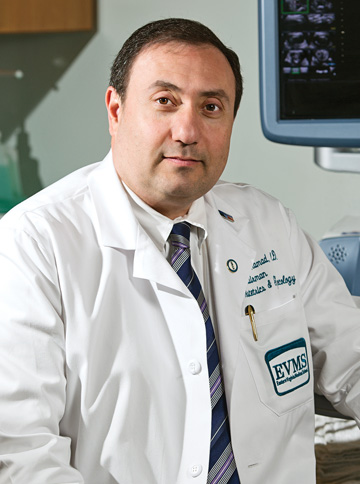Alfred Z. Abuhamad, MD
Eastern Virginia Medical School
Mason C. Andrews Professor and Chair, Department of Obstetrics and Gynecology;
Director of the Maternal-Fetal Medicine Fellowship Program; Vice Dean for Clinical Affairs
 As a high school student in Lebanon, Alfred Abuhamad had to make a decision: “We had to choose between three different tracks: science, math or philosophy. That was standard,” he explains. “The basic classes were the same, but we had more focused studies at a higher level in one of those tracks.” Luckily, the choice wasn’t difficult: he’d had a tremendous interest in science and biology from childhood, and was particularly intrigued with life science.
As a high school student in Lebanon, Alfred Abuhamad had to make a decision: “We had to choose between three different tracks: science, math or philosophy. That was standard,” he explains. “The basic classes were the same, but we had more focused studies at a higher level in one of those tracks.” Luckily, the choice wasn’t difficult: he’d had a tremendous interest in science and biology from childhood, and was particularly intrigued with life science.
If the choice was easy, life was anything but. “I grew up during the civil war,” Dr. Abuhamad says. “In Beirut, we were right in the middle of it.” Despite the challenges living in a warzone presented, he earned his medical degree from the American University of Beirut.
Striving to advance his knowledge as far as possible, Dr. Abuhamad decided to pursue his studies in the United States. He completed his residency in obstetrics and gynecology and a fellowship in high risk obstetrics, both at the University of Miami. During this time, he developed a profound interest in ultrasound, and moved to New Haven to pursue a second fellowship in prenatal diagnosis and ultrasound at Yale.
“I felt in the field of maternal fetal medicine, ultrasound allows us to elevate the fetus to the status of patient, because we can look at the baby and determine if there are problems,” Dr. Abuhamad says. “We can also anticipate problems and address them in utero to improve the outcome.”
By the time he left Yale, his parents had come to America to flee the war, joining his brother in Boston. Dr. Abuhamad had hoped to find a position nearby, where he could be close to his family. He interviewed at several facilities, nearly signing a contract with Tufts, when he received a call that changed his plans. “It was Arthur Evans,” Dr. Abuhamad says. “He was at UC Davis, and was being recruited to come to EVMS to start the division of maternal fetal medicine. Dr. Evans had gotten my name from Dr. Peter Heyl, who had recommended me highly.”
Dr. Abuhamad didn’t know where Norfolk was, but when he talked with Dr. Evans, he was intrigued to find out more about the medical school’s budding plans for a division in maternal fetal medicine. “It was January of 1992,” Dr. Abuhamad remembers. “I flew down on a Friday, and I felt immediately attracted to the place. Dr. Evans was really supportive of the program in ultrasound that I wanted to build. I called him back on Monday and told him I wanted the job.” He still remembers that he never even asked about the salary.
It was the opportunity to pursue the potential of ultrasound in an academic setting that made the choice as easy as the one he’d made in high school. “We use ultrasound in obstetrics to date a pregnancy or diagnose complications – not only malformations in the fetus, but the baby’s overall well-being,” he says. “In gynecology, we can detect ovarian cancer, uterine malformations and other conditions. That’s what I started here, and the program has grown clinically. On the research side, we’ve received both national and international attention.”
Additionally, Dr. Abuhamad has received acclaim for his patents, and for the books he’s written and co-authored, two of which deal with fetal echocardiography. Both are in wide use and available from a number of commercial and medical booksellers. His third book, however, will not be for sale; he intends to offer it as open access download to anyone throughout the world. Near completion, the book, entitled Basic Obstetric and Gynecologic Ultrasound, is not about making money. Rather, it’s an extension of the many missions Dr. Abuhamad has led throughout the developing world – in remote areas of Haiti, Somaliland, Ghana and Mongolia.
He explains: “I started an outreach committee of ISUOG, the International Society of Ultrasound Obstetrics and Gynecology. We have partners in industry who donate ultrasound machines. We then send trainers to developing countries to train physicians and midwives in the use of ultrasound, with the goal of reducing complications in pregnancy and labor, and reducing maternal mortality and morbidity. These caregivers can rarely afford books, but they often have Internet. I knew it would be beneficial to have a book that anybody could download.” When completed, the book will be offered through the EVMS website.
Between seeing patients, writing, research and inventing, there’s little time left for other activities – but Dr. Abuhamad uses what he has effectively. He’s the faculty director of the women’s health clinic within HOPES, an initiative begun several years ago by EVMS students to offer medical care to Norfolk’s indigent, uninsured population. He currently chairs the Safety in Women’s Health Care council, which works on initiatives to reduce maternal mortality within the US. “The major causes of maternal mortality are postpartum hemorrhage, severe hypertension, clots that go to the lungs and heart problems,” Dr. Abuhamad says. “We’re working at a national level to have an impact.”
The division is also in putting together a comprehensive program to study fetal origins of adult disease. “If we can identify high-risk newborns, we may be able to intervene sooner to ameliorate problems that happen later in life,” he says. And of course, ultrasound is part of it.
And best of all, he says, he still gets to deliver babies.

